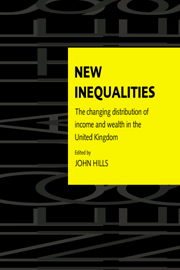Book contents
- Frontmatter
- Contents
- List of figures
- List of tables
- List of contributors
- Acknowledgements
- 1 Introduction: after the turning point
- Part I Income distribution
- Part II Components of income
- 6 What has happened to the wages of men since 1966?
- 7 Women's pay and family incomes in Britain, 1979–91
- 8 More work in fewer households?
- 9 Self-employment and the distribution of income
- 10 Fairer or Fowler? The effects of the 1986 Social Security Act on family incomes
- Part III Spatial aspects
- Part IV Income and wealth
- Bibliography
- Index
8 - More work in fewer households?
from Part II - Components of income
Published online by Cambridge University Press: 22 September 2009
- Frontmatter
- Contents
- List of figures
- List of tables
- List of contributors
- Acknowledgements
- 1 Introduction: after the turning point
- Part I Income distribution
- Part II Components of income
- 6 What has happened to the wages of men since 1966?
- 7 Women's pay and family incomes in Britain, 1979–91
- 8 More work in fewer households?
- 9 Self-employment and the distribution of income
- 10 Fairer or Fowler? The effects of the 1986 Social Security Act on family incomes
- Part III Spatial aspects
- Part IV Income and wealth
- Bibliography
- Index
Summary
Introduction
Britain has experienced two deep recessions in the last 15 years. In the intervening period it also enjoyed one of the longest spells of continuous employment growth this century. By 1990 the level of employment, among the population of working age, had recovered to virtually the same as that prevailing in the mid-1970s. Yet over the same period, between 1975 and 1990, the number of claims for benefits by people under pension age, excluding double counting for multiple-benefit claims, increased by around 1.7 million. In the subsequent recession the number of claims rose by a similar amount again. The Department of Social Security has forecast a continued rise in benefit dependency into the next century. The ability of the state to finance these claims is once again a source of public concern.
As a single claim for means-tested benefit will normally cover the entire household, the number of adults reliant on state support has risen by even more than the growth in the number of claims. This, then, offers a potential explanation of the paradox of rising dependency with growing employment levels, since means-tested benefit is normally limited to where both members of a couple are without work.
Using data drawn mainly from the Labour Force Survey (LFS) this study documents the rise in the number of households without access to earned income and explores why this occurred in periods when aggregate employment was growing. Throughout, we concentrate exclusively on individuals or households aged 60 or less.
- Type
- Chapter
- Information
- New InequalitiesThe Changing Distribution of Income and Wealth in the United Kingdom, pp. 181 - 207Publisher: Cambridge University PressPrint publication year: 1996
- 26
- Cited by



